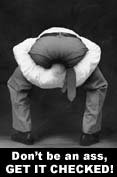
Vitamin B: Good for your arteries!

For years, bodybuilders have been supplementing with B vitamins because of their crucial role in the muscle building process.
Now, scientists have discovered that B vitamins are good for your arteries.
Researchers from Harvard had 529 male test participants between the ages of 40-75 supplement with b vitamins over a 17 year period.
The researchers had the participants complete a questionnaire on their dietary intakes, and compared the results with existing epidemiological data. The results of the study show that there is an inverse relationship between using b vitamin supplements and arterial disease risk.
SOURCE: Merchant, Et al. (2003) The use of B vitamin supplements and peripheral arterial disease risk in men are inversely related. American Society for Nutritional Sciences. 0022-316613.

Tea: It's not for the elderly anymore!

Tea drinking. It is an ancient ritual, enjoyed the world over.
In North America the largest consumers of teas are the elderly, with younger generations consuming soda and other artificially flavored drinks.
According to research, it shouldn't be this way.
A study by Australian researchers has revealed why.
The researchers randomly recruited 1500 participants and had them fast prior to testing. After the fasting, participants were tested for blood pressure, and underwent a urinalysis test.
The study revealed that drinking tea is inversely related to blood pressure. Put another way, higher tea consumption is correlated with a reduction in blood pressure. This does not prove causation, but it does indicate that drinking tea is a step in the right direction.
Bodybuilders have known the value of teas like black, oolong and green for years. Aside from their mild flavor, they lack the processed sugars found in many of today's beverages, and they are also great for loosing weight.
SOURCE: Hodgson, J. et al. (2003). Tea Intake is inversely related to blood pressure in older women. American Society for Nutritional Sciences. 0022-3166/03.
Statistics indicate that 61% of North Americans are obese or overweight, and predictions are that the trend will continue to increase. As if this were not bad enough, new statistics show that diabetes is on the rise also. This is not surprising as obesity and diabetes are positively correlated in virtually all credible studies.
In 2001, 5.1 percent of American adults were diagnosed with diabetes, and in 2002 this number rose to 6.1 percent. While it is clear that these statistics indicate only cases DIAGNOSED, it does speak to the larger truth that there are millions more undiagnosed persons in the general population.
To stem this tide, scientists and doctors are recommending - surprise - dietary reform and resistance exercise.
 It is a sad commentary on society that many people still do not make the connection between diet and health. In fact, so many illnesses would be alleviated by exercise and dietary reform (as evidenced by exercise and dietary reform being universally recommended for many health problems) that the only conclusion to be made is that people are in denial as to the cause of their problems (poor diet and sedentary lifestyle), and the solution (diet reform and exercise).
It is a sad commentary on society that many people still do not make the connection between diet and health. In fact, so many illnesses would be alleviated by exercise and dietary reform (as evidenced by exercise and dietary reform being universally recommended for many health problems) that the only conclusion to be made is that people are in denial as to the cause of their problems (poor diet and sedentary lifestyle), and the solution (diet reform and exercise).
The longer people stay in self-chosen denial, the worse, and more expensive, the nations health problems will become.
Breaking research, studying the interaction between genes and nutrients, has demonstrated that combating obesity may not be as simple as reducing calories and exercising.
For years, advocacy groups for obese persons have been claiming that obesity is a genetic condition, and has little or nothing to do with dietary factors. By contrast, members of the exercise and fitness communities have been claiming that the solution to obesity is to eat less and exercise more. It turns out that both groups have it wrong (although one group has it more correct than the other).
On the one hand, the argument that obesity is a purely genetic condition, and is thus independent of diet, is as logical as saying that defecating is purely a genetic response and is not related to dietary factors. It is obvious that to defecate food is required. It is also obvious from looking at people who starve themselves that low calorie intake results in emaciation. If obesity really were a purely genetic condition, obese persons would spontaneously become obese, as a result of a gene expressing itself. Put another way, if obesity were attributed to genetics exclusively, then obese persons would gain 250 pounds instantly, like in the movie the Nutty Professor, starring Eddie Murphy.
Genetic conditions express themselves unpredictably, such as in the case of the late John Ritter who passed away from a genetic heart condition.
On the other hand, it is not a scientifically sound statement to say that eating less and exercising more is all that is required to treat obesity, especially when scientific evidence illustrates otherwise.
Recent research has examined the underlying causes of obesity, and scientists have discovered that leptin down regulates the ability of fat sites to take up dietary fat.
The fact that adipocytes can uptake dietary fat at all, and that this process can be blocked, shows that obesity is both a genetic AND a dietary issue.
The discovery that leptin can block fat absorption by the adipocyte will stimulate the development of new supplements that will help bodybuilders stay lean.
SOURCE: Xinqing, F. et al. (2003). Leptin and insulin modulate nutrient partitioning and weight loss in ob/ob mice through regulation of long-chain fatty acid uptake by adipocytes. American Society for Nutritional Sciences. 133:2707-2715.

Prostate Check-up: Worthwhile?

Many men despise the thought of getting a physical examination, and rightly so.
With the physical examination comes the prostate exam. Typically, the physician digitally examines the prostate, causing extreme discomfort for the patient.
The trauma of the whole procedure begs the question: Is it REALLY worthwhile to have a prostate checkup?
Yes, according to research.
 Danish researchers did a study on 17,000 men and found that a regular prostate checkup every four years beginning at age 45 was a sure-fire method of detecting cancers early - a critical thing if the cancer is to be responsive to treatment.
Danish researchers did a study on 17,000 men and found that a regular prostate checkup every four years beginning at age 45 was a sure-fire method of detecting cancers early - a critical thing if the cancer is to be responsive to treatment.
The prostate is responsible for testosterone production, and thus prostate health should be of concern to every serious athlete.
Source: Journal of the National Cancer Institute, 2003;95:1462-1466

Calcium fights the effects of e-coli!

Almost all bodybuilders are aware of e-coli. This familiar enemy lurks in beef products everywhere. If it gets into the human digestive tract, serious and often fatal consequences can result.
New research indicates that, depending upon the strain, calcium can help fight the effects of e-coli.
This discovery will help bodybuilders as bodybuilders need to be in optimum health to reap maximum benefit from the lifestyle.
SOURCE: Gastroenterology (2003). August.
Disclaimer
The information provided in this publication is for educational and informational purposes only and does not serve as a replacement to care provided by your own personal health care team or physician. The author does not render or provide medical advice, and no individual should make any medical decisions or change their health behavior based on information provided here. Readers are encouraged to confirm the information contained herein with other sources. Readers and consumers should review the information in this publication carefully with their professional health care provider. The information in this or other publications authored by the writer is not intended to replace medical advice offered by physicians. Reliance on any information provided by the author is solely at your own risk. The author does not recommend or endorse any specific tests, products, medication, procedures, opinions, or other information that may be presented in the publication. The author does not control information, advertisements, content, and articles provided by discussed third-party information suppliers. Further, the author does not warrant or guarantee that the information contained in written publications, from him or any source is accurate or error-free. The author accepts no responsibility for materials contained in the publication that you may find offensive. You are solely responsible for viewing and/or using the material contained in the authored publications in compliance with the laws of your country of residence, and your personal conscience. The author will not be liable for any direct, indirect, consequential, special, exemplary, or other damages arising from the use of information contained in this or other publications.
Copyright © Clayton South, 2003 All rights reserved.
Without limiting the rights under copyright reserved above, no part of this publication may be reproduced, stored in or introduced into a retrieval system, or transmitted in any form, or by any means (electronic mechanical, photocopying, recording, or otherwise), without the prior written permission of the copyright holder and author of this publication.
Thanks,
